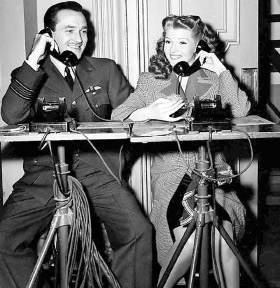 Telephone etiquette Telephone etiquette
by Amal Hewavissenti
The telephone is unarguably the
most widespread and most powerful tool of communication at a local and
global level. How you respond to it and how you express yourself through
it assuredly mirrors how you deal with neighbours, friends and the world
at large.
To be frank, your telephone conversation is capable of earning you a
large number of people or keeping you aloof from them. To make a long
story short, the words or feelings you verbalize through the phone may
make you the most popular or the most repulsive person on earth within
seconds, however well-disposed you may be.
The first thing you should bring into sharp focus is that you are to
switch over to a composed and agreeable mood when answering or voicing
your message on the phone. It reflects badly on your image to keep
yourself obsessed with something and answer the person on the other end
absent-mindedly. It is better if you can avoid speaking nonchalantly but
sensitive responses and active cooperation in the conversation you have,
are really rewarding.
One’s personal mood, if negative at the time of speaking actually
distorts the other’s otherwise clear, friendly tone. One’s capacity to
understand the caller and the inner tranquillity may have a combined
effect on the listener. In order to preserve a highly friendly
relationship, it is advisable to pleasantly start the discourse by
wishing “Good morning,” “Good afternoon,” or “Good evening” and
terminate the dialogue by wishing the caller with phrases such “Bye for
now,” “Good night,” “Have a nice time,” and so forth.
You should not in any way spoil or use up the caller’s valuable time
by repeating the same thing, jabbering with little sense or by asking
after health.
This will earn you the label of “annoying and nauseating caller” and
others will be compelled to switch off the phone just as they see your
number on the screen. It is a cardinal error to deliberately ignore the
fact that there is a high level of danger in “sporting” with unknown
callers. A change of one or two figures in your telephone number will
bring you into contact with a “stranger caller” who had mistakenly
dialled your number. It is better to affably explain to him that he has
just made a mistake with the number without carrying out a prolonged
discussion which may make the caller depend unnecessarily on you and
keep calling you until you realise that “it is too late”.
In short, you mustn’t joke or tease the intrusive callers as there
are ample cases in society to illustrate the bad repercussions.
Perhaps you might be having the tendency to speak in a voice with a
raised volume and to let the high pitched ringing tones play in a
troublesome way particularly in public places or conferences. You will
assuredly cut a sorry figure if you vociferously talk about private
affairs to be heard above others simply because it shows who you are.
 So focus on where you are and who you are with when speaking aloud on
the phone. Furthermore, just think about a person who is crossing a road
of traffic with his phone on his ear. This is not proper telephone
etiquette but sheer destruction brought to their own threshold. So focus on where you are and who you are with when speaking aloud on
the phone. Furthermore, just think about a person who is crossing a road
of traffic with his phone on his ear. This is not proper telephone
etiquette but sheer destruction brought to their own threshold.
Just imagine yourself at an office with the assigned duty to give
messages and take messages through the phone. There you will enjoy
personal success if you reply to any inquiry or give your details with a
very clear voice and in clear, polite language. This can easily be done
by keeping the caller well-assured that he has got in touch with the
correct institution and by telling him the name of the particular
institution you’re in, followed by your telephone number. If the
particular person he wants to contact is away from or absent from the
office, be kind and polite enough to take the message the caller wants
to deliver. You can possibly say “I’m sorry. He is not in at the moment.
I can let him have your message. If you like let me have your message
for him,” or “please call after 15 minutes.” This establishes the
caller’s trust in you. Most importantly, if someone chances to ask you a
specific favour through the phone, make arrangements to give it as early
as possible. It is perfectly improper and impolite to keep him long on
the phone and finally offer lame excuses for your inability to give the
help asked for.
So don’t unleash your personal mood on the phone!
|

